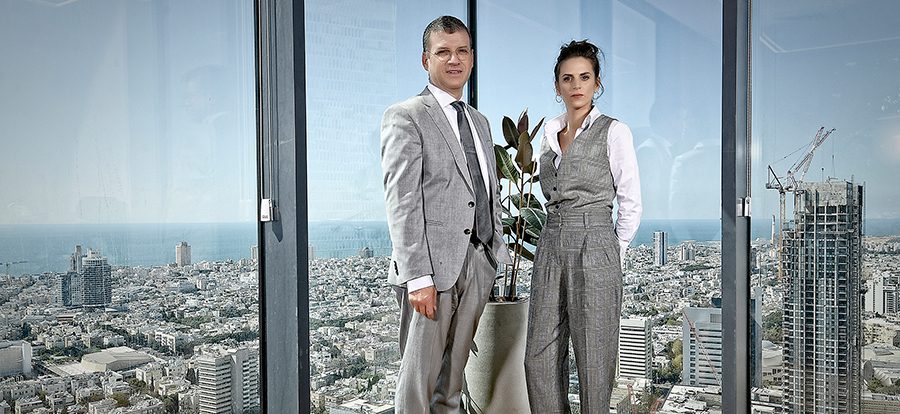BrandVoice
As we enter the last stretch of 2022, we can already sum up the year as one of the most volatile in recent decades. Global inflation is running wild, and in response, central banks all over the world are implementing aggressive, restrictive monetary policies and a succession of interest rate hikes — even at the cost of a global recession and a bear market. As a result, after years of boiling feverishly, the global markets have declined in tens of percentage points since the start of the year, and both public and private companies lost a significant portion of their value.
But according to the experts, managers of the Tel Aviv branch of Sullivan & Worchester law firm, there is no need to panic. With years of experience and expertise in the American and Israeli stock markets, Oded Har-Even and Reut Alfiah, who have seen these kinds of crises before and have amassed decades of experience and insight in market behavior, see the present crisis, like others which preceded it, as temporary. Moreover, in their professional opinion, this challenging period actually presents companies with business opportunities. However, careful, measured and considered management is required in order to weather the storm and come out the other side stronger.
“It is important to internalize that the financial markets behave in a cyclical pattern,” lawyer Oded Har-Even emphasizes. “We have experienced crises like this in the past, like the dot-com crash in 2000, the 2008 financial crisis, or the COVID crisis at the beginning of 2020. Each time the market recovered and surged ahead. Now because of inflation and the restrictive monetary policy we fell — it was clear that the fall was coming. We can see the cyclicality here plainly and there is no doubt that this is another phase, another healthy correction in the markets’ behavior which will surely resume rising.”

“Even in the present negative sentiment, companies still go public. It is possible and even desirable to go public, the question is about structure and how to do it properly,” Reut Alfiah adds. “In just the past month and a half, we assisted two Israeli companies in getting listed on the Nasdaq. They were forced to compromise on the starting value in the structure, and under difficult conditions — and still, these companies managed to raise all of the money they wanted and now they can implement their vision to support future growth and deliver real value for their investors.”
“In the end the trick, in high tide times, is for companies to raise and save money. Now, during the downturn when there is money in the coffers, they have excellent acquisition opportunities. They can allow themselves to buy companies that didn’t raise funds,” Har-Even notes. “In the public market you can be like the phoenix – rising from the ashes and being reborn, cyclically. Fall 90% and then shoot up,” he adds, “When we began to represent Dario-Health it traded for a few cents a share and then reached a value of hundreds of millions of dollars. Nano-Dimension was worth $12 million dollars at the beginning of 2020 and at the height of its fundraising was worth several billion. It’s all very flexible and what comes down can come back up just as fast,” notes Har-Even.
“Nano-Dimension may be trading below cash today but that shouldn’t worry them — they have all the money to proceed with their vision,” Alfiah clarifies. “They don’t have to focus on the current market value, it isn’t relevant to the management of the company. What is important is that they have enough cash to support their growth — growth which will ultimately translate into a rise in the company’s market value as the markets resume rising.”

The fundraising and purchase transactions of Nano-Dimension, which currently holds a large cash fund of approximately $1.3 billion dollars, and which completed the acquisition of no less than five companies in the past year, was led by Sullivan Tel Aviv under the management of attorneys Har-Even and Alfiah; the Tel Aviv branch signed hundreds of other transactions, too. Since the establishment of Sullivan Tel Aviv, the global firm has handled some 200 transactions in the capital market totalling about $10 billion dollars and, as of now, is consulting about 40 Israeli companies traded on Nasdaq, close to a third of the total number of Israeli Nasdaq-traded companies. So it is not surprising that as the only office in Israel that is part of a global American firm, specializing in both American and Israeli law, Sullivan Tel Aviv advises the largest number of Israeli Nasdaq companies among all law firms in both Israel and the US.
It is this kind of success that brought lawyers Har-Even and Alfiah to lead the prestigious Israeli branch. Sullivan & Worcester has 80 years of experience and branches all over the world, from New York, Boston, Washington, to Tel Aviv and London and even as far as East Asia.
Har-Even, who has been a partner for many years at the New York office of the American firm, gained deep and extensive experience representing New York investment banks. Experienced in stock issuing and private allocations, he specializes in consulting public companies in matters of financing, corporate governance, due and proper disclosure, and was involved in a large number of initial public offerings (IPOs) for private, Israeli technology companies on Wall Street, including dual listings on Nasdaq of Israeli companies. Alfiah, who, together with Har-Even, is the managing partner of Sullivan Tel Aviv, specializes in advising public Israeli companies in stock issuing and private allocations in Israel and the US, including joint guidance on corporate governance issues, securities, and unique expertise in tech, life sciences, and renewable energy. In addition to international companies, she advises Israeli companies listed on the stock exchanges in Tel Aviv and abroad and also deals with private and public funding, commercial transactions, mergers and acquisitions.
Now, in the present, turbulent period, how would you advise companies to conduct themselves?
Har-Even: “Most importantly, not to panic. All the companies are in a tricky situation and it is a matter of cycles. Whoever raised money should hang onto it. Not to be tempted to purchase their own shares (buy-back). Unless it’s a company that has a ton of money in their coffers and wants to improve the stock performance — then it’s very legitimate and logical to do a buy-back. On the other hand, a company that has enough money for half a year can’t think seriously about that. It would be better for them to not waste the money that they raised. This crisis is also a great opportunity for a lot of companies with money. It is important that they use it wisely to acquire other companies, moves that will support their future growth. Whoever doesn’t have money and did not raise enough and wasted too much, should save and raise funds when it’s possible. Also under conditions that might not be optimal.”
Alfiah: “On the fundraising level there is a discrepancy between a company that is traded in Tel Aviv and a company that is traded on the Nasdaq. For those traded in Tel Aviv, they issued in the last cycle and they still have those funds, even those who recorded declines and lost value, they really should not wait. They should take advantage of the opportunity in this time and do a cross-listing. Unnecessary waiting can erode their value even more and be even harder for them to complete a secondary fund in Israel than in the Nasdaq.
And looking to the future, how do you see 2023?
Alfiah: “It’s hard to predict in the current climate, but you must remember that this whole period brings opportunities together with the challenge – the trick is to meet the challenge by taking advantage of the opportunity.”
Har-Even: “I personally think that in 2023, maybe toward the end of the year, the market will begin to recover. At a certain point the correction must come. Just like our not-so-distant history taught us. Every recession comes to an end at some point. We see that especially in the Microcap stock (public companies with a market value of $50 to 300 million dollars) today there are a little more transactions in that sector compared to the situation a few months ago. It might be an indication that we will see more transactions, perhaps in the second half of 2023.”
“In the end, the market recovers, there’s no doubt,” Alfiah concludes, “The question is not ‘if’ but ‘when.’”
BrandVoice is Forbes’s Marketing content brand





